英语语文版基础模块下册教案全
语文版中职英语(基础模块下册)Unit1《Travel》word教案

语⽂版中职英语(基础模块下册)Unit1《Travel》word 教案TEACHING PLANUnit 1 How often do you exercise?Ⅰ. Knowledge Objectives1. Master how to use adverbs of frequency properly (always, usually, often, sometimes,hardly ever, never, how often, once, twice, three times a week, every day).2. Master how to describe the arrangements of activities in the spare time。
3. Master how to describe the eating hobbits and how to keep healthy (milk, junk food, health,unhealthy).Ⅱ. Ability Objectives1. Improve the students’ skills of speaking, reading, listening and writing.2. Train the students to formulate adverbs of frequency accurately by using some effectivelearning methods and information.Ⅲ. Moral ObjectivesEnlighten the students to open their horizon, arrange their daily life efficiently, and have a healthy lifestyle.Ⅳ. Difficulties and focus:1.Master the vocabulary.exercise, hardly, ever, once, twice, time, Internet, program, most, no, result, active, as for, about, coffee, chocolate, drink, health, habit, try, grade, better, same, as, different, difference, maybe, although, for, keep, must2.Master Adverbs of Frequencyalways, usually, often, sometimes, hardly ever, never every day, once a week, twice a month, four times a year3.Master the structures by using Adverbs of FrequencyWhat do you usually do on weekdays? I often go to the movies.How often do you watch TV? I watch TV every day.How often does she/ he eat vegetables? She /He eats them three times a day.How many hours do you sleep every night? I sleep nine hours.真正好的朋友,从来不需要这些表⾯功夫。
2021-2022学年中职英语语文版基础模块下册Unit 1 Greetings被动语态教案

Unit 1 Grammar被动语态教案一、定义主动语态----主语是动作的执行者;被动语态----主语是动作的承受者。
Many people speak Chinese. (主动)很多人讲中文。
Chinese is spoken by many people. (被动)中文被很多人说。
二、主动语态变被动语态回诀:宾变主,主变宾,谓语动词变被动。
①主动语态中的宾语变成被动语态的主语(宾格变主格)②谓语变为被动结构(be+过去分词)③主动语态的主语变为被动语态的宾语(主格变宾格),并由by引导,有时可省略。
④其它成分不变例如He writes a letter every week.主谓宾状A letter is written by him every week.宾变主谓语变被动主变宾其它不变三、不同时态的被动语态结构①一般现在时:an/is/are doneThe flowers are watered every day.花儿每天被浇。
②一般过去时:were/was doneThe mobile phone was invented in1973.移动电话被发明于1973年.③一般将来时:will/shall be doneThe book will be posted tomorrow.这本书明天会被寄出。
④现在进行时:am/is/are being doneA new railway is being built at present.一条新的铁路现在正在被建设.⑤过去进行时:was/were being done Another bridge was being built then.另一座桥那时正在被建。
⑤现在完成时:have/has been doneHis bike has been stolen recently.他的自行车最近被偷了。
⑥过去完成时:had been doneA new building had been built before 2000. 2000年前,一栋新楼被建造了。
中职英语语文版基础模块下册Unit 7 Health Grammar 教案
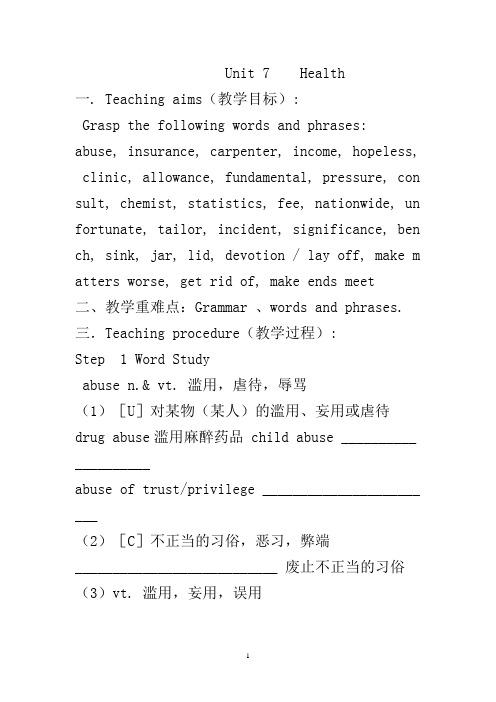
Unit 7 Health一. Teaching aims(教学目标):Grasp the following words and phrases: abuse, insurance, carpenter, income, hopeless, clinic, allowance, fundamental, pressure, con sult, chemist, statistics, fee, nationwide, un fortunate, tailor, incident, significance, ben ch, sink, jar, lid, devotion / lay off, make m atters worse, get rid of, make ends meet 二、教学重难点:Grammar 、words and phrases. 三.Teaching procedure(教学过程):Step 1 Word Studyabuse n.& vt. 滥用,虐待,辱骂(1)[U]对某物(某人)的滥用、妄用或虐待drug abuse滥用麻醉药品 child abuse __________ __________abuse of trust/privilege _____________________ ___(2)[C]不正当的习俗,恶习,弊端___________________________ 废止不正当的习俗(3)vt. 滥用,妄用,误用____________________________不要滥用你的权威。
He _______________( 滥用职权)while in office. Step 2 Grammar: 虚拟条件句1) 当表示与现在事实相反时从句:If + subject + did / were, 主句:Subject + could / would / might / should do2) 当表示与过去事实相反时从句:If + subject +had done, 主句:Subject + could/would/might/should have done3) 当表示与将来事实相反时从句:If + subject +did / should / were to, 主句:Subject + could / would / might / should d oStep 3 Grasp the following sentences:1). To make matters worse, he also had a son i n college who had taken a bank loan to pay for his studies. P752). Three months later, however, Wang Lin was told about a health care project that provides treatment at half the cost or less, depending on the needs of the patient. P753). Thanks to the project and the kindness ofhis family and neighbours, he was able to rece ive treatment in time to prevent the disease f rom ruining his health.Step 4 Fill in the blanks with the phrases ab ove, using proper forms: 1) The vote will have to be _________________ until next week.2) I ___________ my book __________, turned off the light and went to sleep.3) He has been _____________ for several month s.4) The factory has ______________the workers b ecause of the drop in sale.5) We will need to ____________ a good supply of food if this winter is going to be like the last.四、课后作业 P59五、总结评价。
英语语文版基础模块下册教案()全

英语语文版基础模块下册教案Unit 1 Travel Warming up &Word Study一、教学目标1、知识与能力(1)学习长城的一些景点的英语名称,如:the Great Wall, the First Pass Under Heaven, Jiayuguan Pass and so.(2)掌握握一些词汇和短语:rebuild, province, engineer, pick sb. up and so on.(3) 能结合图画进行简单介绍或问答。
2、过程与方法通过教师的讲解和学生的课堂语言实践,提高学生的语言应用能力,并为阅读课做准备。
3、情感态度与价值观学会相互合作;了解长城是世界奇观之一,是我们中国人的骄傲;激发学生的爱国热情和民族自豪感二、教学重点掌握握一些词汇和短语的用法:rebuild, province, engineer, pick sb. up and so on.三、教学难点用英语简单介绍有关长城的情况。
四、教学方法研讨、探究与实践五、课时:一课时课型:新授课六、教学准备:Some Pictures七、教学过程Step1 lead in教师提出问题:What do you know about the Great Wall?Have you ever been to the Great Wall?Where is the First Pass Under Heaven学生回答上述问题。
说明:分享个人经历激发学生热情,活跃班级气氛,进行有效导入。
Step2 Presentation教师展示图片,给出景点的英语名称the Great Wall, the First Pass Under Heaven, Jiayuguan Pass...说明: 学生熟悉英语景点名称,为后面的讨论做准备Step3 Practice in class1.教师讲解词汇和短语的用法:(1)The students read the words and phrases.(2) The students make the sentences with the words and phrases.2.教师布置讨论任务,给出例子:This is a beacon tower. It was used..3.学生分组,介绍长城的景点说明:锻炼学生合作运用英语力Step4 Students' Activity学生表演,,教师给予学生英语口语的帮助并鼓励他们开口说英语。
语文版中职英语基础模块 下册Unit 《Shopping》word教案 (一)

语文版中职英语基础模块下册Unit《Shopping》word教案 (一)本文将介绍“语文版中职英语基础模块下册Unit 《Shopping》word教案”的内容。
该教案主要针对中职学生,通过购物话题的学习,提高学生的英语听说读写能力,培养学生的语言学习兴趣,同时也有助于学生在日常生活中更好地运用英语。
教案内容分为五个部分,依次为前置知识、教学目标、教材分析、教学策略和教学过程。
下面将对这五个部分逐一进行介绍。
一、前置知识本部分主要介绍了学生所需掌握的相关词汇和语法知识,例如商品名称、价格和数量的表达等。
同时,也介绍了一些基本的英语购物场景,如在商店购物或者向店员咨询商品信息等。
二、教学目标本部分明确了学生在学习过程中所要达成的目标,主要包括听、说、读、写四个方面。
具体目标包括学会通过购物场景的实践活动练习基础英语交流能力,掌握购物场景的常用英语表达方式,能够独立完成购物清单的编写和口语表达等。
三、教材分析本部分对所使用的课本Unit进行了详细的分析,包括课本内容、语言难度、教材特点等,为教学提供了有力的支持。
四、教学策略本部分提供了教学策略和方法,旨在帮助教师更好地进行教学。
这些策略和方法包括听说读写相结合、教师示范和学生互动等方式,以帮助学生更加深入地理解和掌握所学内容。
五、教学过程本部分包括了详细的教学过程、课堂活动和评估方式等内容。
它们都是根据前面几个部分的内容设计的,旨在帮助教师有计划地进行教学,提高教学效果。
总之,“语文版中职英语基础模块下册Unit 《Shopping》word教案”为中职学生提供了一份完整的购物英语教学方案,具有很好的参考价值。
教师可根据自己的实际情况,进行适当的调整和改进,帮助学生更好地掌握购物英语知识,同时也更好地运用英语进行日常生活中的交流和沟通。
英语基础模块下册教案

英语语文版基础模块下册教案Unit 1 Travel Warming up&Word Study一、教学目标1、知识与能力(1)学习长城的一些景点的英语名称,如:the Great Wall,the First Pass Under Heaven,Jiayuguan Pass and so.(2)掌握握一些词汇和短语:rebuild,province,engineer,pick sb up and so on.(3) 能结合图画进行简单介绍或问答。
2、过程与方法通过教师的讲解和学生的课堂语言实践,提高学生的语言应用能力,并为阅读课做准备。
3、情感态度与价值观学会相互合作;了解长城是世界奇观之一,是我们中国人的骄傲;激发学生的爱国热情和民族自豪感二、教学重点掌握握一些词汇和短语的用法:rebuild,province,engineer,pick sb up and so on.三、教学难点用英语简单介绍有关长城的情况。
四、教学方法研讨、探究与实践五、课时:一课时课型:新授课六、教学准备:Some Pictures七、教学过程Step1 lead in教师提出问题:What do you know about the Great Wall?Have you ever been to the Great Wall?Where is the First Pass Under Heav学生回答上述问题。
说明:分享个人经历激发学生热情,活跃班级气氛,进行有效导入。
Step2 Presentation教师展示图片,给出景点的英语名称the Great Wall,the First Pass Under Heaven,Jiayuguan Pass...说明:学生熟悉英语景点名称,为后面的讨论做准备Step3 Practice in class1.教师讲解词汇和短语的用法:(1)The students read the words and phrases.(2) The students make the sentences with the wors and phrases.2.教师布置讨论任务,给出例子:This is a beacon tower.It was used..3.学生分组,介绍长城的景点说明:锻炼学生合作运用英语力Step4 Students' Activity学生表演,,教师给予学生英语口语的帮助并鼓励他们开口说英语。
英语基础模块下册教案(完整资料).doc
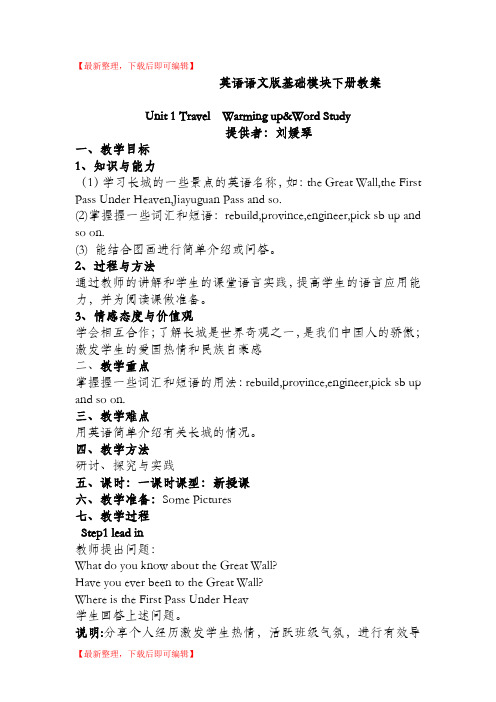
【最新整理,下载后即可编辑】英语语文版基础模块下册教案Unit 1 Travel Warming up&Word Study提供者:刘媛琴一、教学目标1、知识与能力(1)学习长城的一些景点的英语名称,如:the Great Wall,the First Pass Under Heaven,Jiayuguan Pass and so.(2)掌握握一些词汇和短语:rebuild,province,engineer,pick sb up and so on.(3) 能结合图画进行简单介绍或问答。
2、过程与方法通过教师的讲解和学生的课堂语言实践,提高学生的语言应用能力,并为阅读课做准备。
3、情感态度与价值观学会相互合作;了解长城是世界奇观之一,是我们中国人的骄傲;激发学生的爱国热情和民族自豪感二、教学重点掌握握一些词汇和短语的用法:rebuild,province,engineer,pick sb up and so on.三、教学难点用英语简单介绍有关长城的情况。
四、教学方法研讨、探究与实践五、课时:一课时课型:新授课六、教学准备:Some Pictures七、教学过程Step1 lead in教师提出问题:What do you know about the Great Wall?Have you ever been to the Great Wall?Where is the First Pass Under Heav学生回答上述问题。
说明:分享个人经历激发学生热情,活跃班级气氛,进行有效导入。
Step2 Presentation教师展示图片,给出景点的英语名称the Great Wall,the First Pass Under Heaven,Jiayuguan Pass...说明:学生熟悉英语景点名称,为后面的讨论做准备Step3 Practice in class1.教师讲解词汇和短语的用法:(1)The students read the words and phrases.(2) The students make the sentences with the wors and phrases.2.教师布置讨论任务,给出例子:This is a beacon tower.It was used..3.学生分组,介绍长城的景点说明:锻炼学生合作运用英语力Step4 Students' Activity学生表演,,教师给予学生英语口语的帮助并鼓励他们开口说英语。
语文版中职英语(基础模块 下册)Unit 3《English Study》word教案
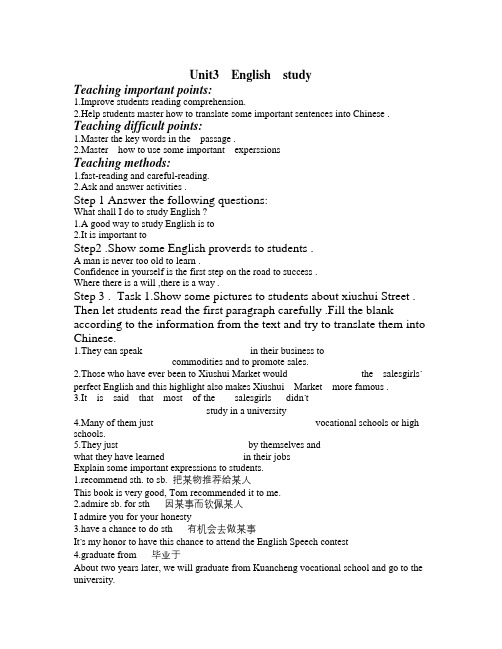
Unit3 English studyTeaching important points:1.Improve students reading comprehension.2.Help students master how to translate some important sentences into Chinese . Teaching difficult points:1.Master the key words in the passage .2.Master how to use some important experssionsTeaching methods:1.fast-reading and careful-reading.2.Ask and answer activities .Step 1 Answer the following questions:What shall I do to study English ?1.A good way to study English is to ____________2.It is important to __________________________Step2 .Show some English proverds to students .A man is never too old to learn .Confidence in yourself is the first step on the road to success .Where there is a will ,there is a way .Step 3 .Task 1.Show some pictures to students about xiushui Street . Then let students read the first paragraph carefully .Fill the blank according to the information from the text and try to translate them into Chinese.1.They can speak ___________ in their business to______________ commodities and to promote sales.2.Those who have ever been to Xiushui Market would _________ the salesgirls’perfect English and this highlight also makes Xiushui Market more famous .3.It is said that most of the salesgirls didn’t______________________ study in a university4.Many of them just _____________________ vocational schools or high schools.5.They just ________________________ by themselves and _______what they have learned __________ in their jobs________________Explain some important expressions to students.1.recommend sth. to sb. 把某物推荐给某人This book is very good, Tom recommended it to me.2.admire sb. for sth 因某事而钦佩某人I admire you for your honesty3.have a chance to do sth 有机会去做某事It‘s my honor to have this chance to attend the English Speech contest4.graduate from 毕业于About two years later, we will graduate from Kuancheng vocational school and go to the university.5.keep on doing sth 持续不断、坚持做某事He keep on doing homework for 2 hours.6.put……into practice 把……付诸实践We should put our ideas into practice.7.with confidence 充满信心We should face the life with confidence.Step4.Task 2.Read the second paragraph and fill in the blank .1.When we first start to study English, many of us thinkEnglish is _____________________ .2.so some of us ______________ or even give up.3.The salesgirls in Xiushui Market ____________us in learning English. Explain some important expressions to students.1.too......to ... 太.....而不能........The question is too difficult to answer.He is too young to join in the army.2. Lose confidence 失去信心She lose confidence in life .3. set a good example to 为......树立好榜样LeiFeng set a good example to us .Step5.Have a testComplete the follow sentences with the correct words in the box With confidence set a good example to too ...to.... graduate...from ..1.The child is _________ young _______ go to school .2.Our teacher has _________________ us in speaking English .3.You should answer these difficult questions ____________ .4.When did you _____________ Kuancheng vocational school ?Step 5 .Homework .1.Remember how to use the useful expressions .2.Reading the passage after class .。
语文版中职英语(基础模块 下册)Unit 1《Travel》word教案
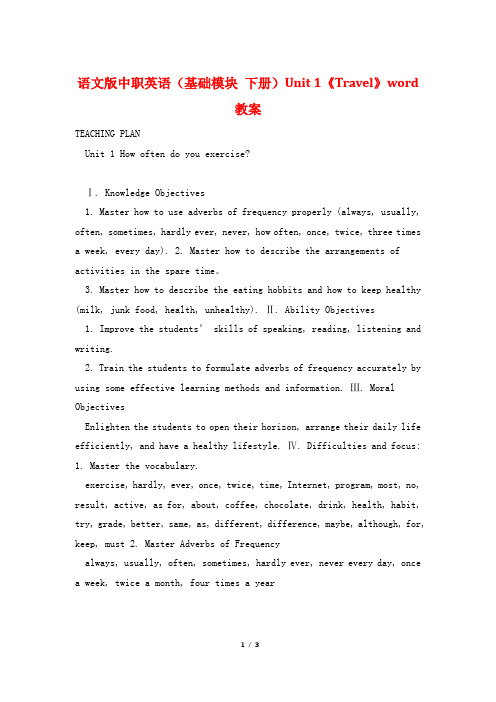
语文版中职英语(基础模块下册)Unit 1《Travel》word教案TEACHING PLANUnit 1 How often do you exercise?Ⅰ. Knowledge Objectives1. Master how to use adverbs of frequency properly (always, usually, often, sometimes, hardly ever, never, how often, once, twice, three times a week, every day).2. Master how to describe the arrangements of activities in the spare time。
3. Master how to describe the eating hobbits and how to keep healthy (milk, junk food, health, unhealthy). Ⅱ. Ability Objectives1. Improve the students’ skills of speaking, reading, listening and writing.2. Train the students to formulate adverbs of frequency accurately by using some effective learning methods and information. Ⅲ. Moral ObjectivesEnlighten the students to open their horizon, arrange their daily life efficiently, and have a healthy lifestyle. Ⅳ. Difficulties and focus: 1. Master the vocabulary.exercise, hardly, ever, once, twice, time, Internet, program, most, no, result, active, as for, about, coffee, chocolate, drink, health, habit, try, grade, better, same, as, different, difference, maybe, although, for, keep, must 2. Master Adverbs of Frequencyalways, usually, often, sometimes, hardly ever, never every day, once a week, twice a month, four times a year3. Master the structures by using Adverbs of Frequency What do you usually do on weekdays? I often go to the movies. How often do you watch TV? I watch TV every day.How often does she/ he eat vegetables? She /He eats them three times a day. How many hours do you sleep every night? I sleep nine hours. Ⅴ.Tasks : Task1: The activities on weekdays Contents Language goals P.1-2 Talk about The activities on weekdays and How often you do things. How often do you exercise? Task2: How to improve English study Period 1 Task3: My eating habits Task4: Who is the healthiest? Target language What do you usually do on weekends? How often do you watch TV? Vocabulary How often, sometimes, hardly ever, twice, once, time, never, Internet, program Survey your friends: The activities on weekdays Task What do you usually / often / sometimes / hardly ever / never do on weekdays? Step1: Lead in Show the students some different activities by asking What do you usually do on weekends during the summer holidays? I often go to the movies. / I sometimes go swimming. / I never go fishing. Step2: Present words and phrases: always, usually, often, sometimes, hardly Teaching ever, never…What do you do on weekends? I always / usually/ often/sometimes/hardly ever/never… Step3: Activity 1a-1b 1. Make a list of the different weekend activities. 1a 2. Play the tape. The Ss listen and write the letters. 1b 3. Practice in pairs. Step4: Make a conversation Procedures Learn how to express the times. Once, twice, three times, four times How often does he /she do his homework/ surf the internet/…? He /She does his homework/ surfs the internet/… every day/ once a week/ twice a month/ four times a year/…? Step5: Activity 2a-2b 1. Play the tape. The Ss listen and number the activities. 2. Listen again. Match the activities with the number of times he does them. Step6: Task1 The activities on weekdays 1. Read the conversation 2c. 2. Make a survey: Ask and answer in pairs, then fill in the chart. Step7: Report and then write them down. Report your and yourfriend’s activities on the weekdays. Summary and do exercises. Period 2 Contents Language goals Target language P3 Talk about how often the students do things at school. How often do you read English books? How often does he /she do home work? All / Most/ some /No students exercise once or twice a week. Vocabulary all…, most…, some…, no…, the result , as for Task How to Improve English Study Step1: lead in A guessing game for activities on weekends. Step2: Ask and answer What do you do on weekends? I always / usually/ often/sometimes/hardly ever/never… How often does he / she exercise /…? Teaching He / She exercises once or twice a week. Step4: Activity 3 1. Read and learn the information in the charts carefully. 2. learn how to use “ all , most, some, no ” 3. Learn the new words : result, as for 4. Read the magazine carefully and fill in the blanks Step5: Make a survey 1. Survey: Class Activities in groups. Procedures 2. Make a report according to Activity 3. Step6: Task 2 Make a survey: How to improve our English? Teacher introduces the activity. How to improve our English? How do we study English well? The students answer the questions freely. Write down the answers in the first row. (Speak English , listen to English , keep a diary, …) 1. Group work: Who’s the best English student? 2. Interview: Improve English Study by asking How often do you read English books/ sing English songs/watch English programs/listen to English tapes/join the English corner/chat with foreigner…? 3. Ask classmates the questions. And write down them in the chart. Step7: Report and write it down The good habits for English study Summary and do exercises Period 3 Contents Language goals Target language Task P4 How often do you eat vegetables? Talk about the eating habits. How often do you exercise? How often do you drink milk? How many hours do you sleep every night? My eating habits. Vocabulary junk, junk food, milk, health, interviewer。
英语基础模块下册教案

英语语文版基础模块下册教案Unit 1 Travel Warming up&Word Study提供者:刘媛琴一、教学目标1、知识与能力(1)学习长城的一些景点的英语名称,如:the Great Wall,the First Pass Under Heaven,Jiayuguan Pass and so.(2)掌握握一些词汇和短语:rebuild,province,engineer,pick sb up and so on.(3) 能结合图画进行简单介绍或问答。
2、过程与方法通过教师的讲解和学生的课堂语言实践,提高学生的语言应用能力,并为阅读课做准备。
3、情感态度与价值观学会相互合作;了解长城是世界奇观之一,是我们中国人的骄傲;激发学生的爱国热情和民族自豪感二、教学重点掌握握一些词汇和短语的用法:rebuild,province,engineer,pick sb up and so on.三、教学难点用英语简单介绍有关长城的情况。
四、教学方法研讨、探究与实践五、课时:一课时课型:新授课六、教学准备:Some Pictures七、教学过程Step1 lead in教师提出问题:What do you know about the Great Wall?Have you ever been to the Great Wall?Where is the First Pass Under Heav学生回答上述问题。
说明:分享个人经历激发学生热情,活跃班级气氛,进行有效导入。
Step2 Presentation教师展示图片,给出景点的英语名称the Great Wall,the First Pass Under Heaven,Jiayuguan Pass...说明:学生熟悉英语景点名称,为后面的讨论做准备Step3 Practice in class1.教师讲解词汇和短语的用法:(1)The students read the words and phrases.(2) The students make the sentences with the wors and phrases.2.教师布置讨论任务,给出例子:This is a beacon tower.It was used..3.学生分组,介绍长城的景点说明:锻炼学生合作运用英语力Step4 Students' Activity学生表演,,教师给予学生英语口语的帮助并鼓励他们开口说英语。
语文版中职英语(基础模块 下册)Unit 1《Travel》word教案
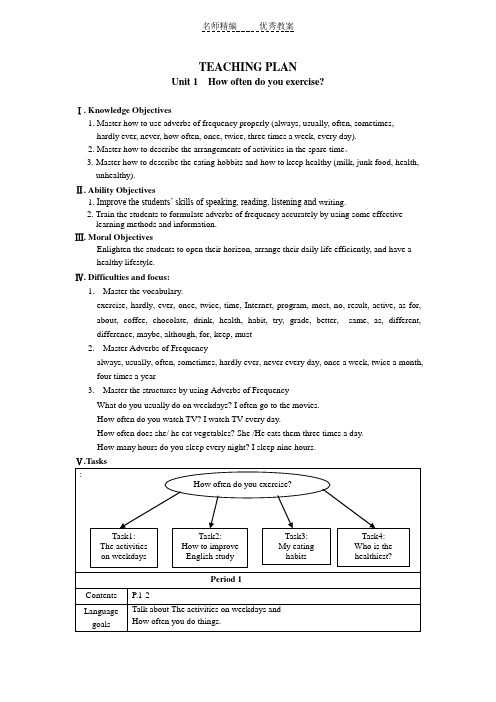
TEACHING PLANUnit 1 How often do you exercise?Ⅰ. Knowledge Objectives1. Master how to use adverbs of frequency properly (always, usually, often, sometimes,hardly ever, never, how often, once, twice, three times a week, every day).2. Master how to describe the arrangements of activities in the spare time。
3. Master how to describe the eating hobbits and how to keep healthy (milk, junk food, health,unhealthy).Ⅱ. Ability Objectives1. Improve the students’ skills of speaking, reading, listening and writing.2. Train the students to formulate adverbs of frequency accurately by using some effectivelearning methods and information.Ⅲ. Moral ObjectivesEnlighten the students to open their horizon, arrange their daily life efficiently, and have a healthy lifestyle.Ⅳ. Difficulties and focus:1.Master the vocabulary.exercise, hardly, ever, once, twice, time, Internet, program, most, no, result, active, as for, about, coffee, chocolate, drink, health, habit, try, grade, better, same, as, different, difference, maybe, although, for, keep, must2.Master Adverbs of Frequencyalways, usually, often, sometimes, hardly ever, never every day, once a week, twice a month, four times a year3.Master the structures by using Adverbs of FrequencyWhat do you usually do on weekdays? I often go to the movies.How often do you watch TV? I watch TV every day.How often does she/ he eat vegetables? She /He eats them three times a day.How many hours do you sleep every night? I sleep nine hours.。
语文版中职英语(基础模块下册)Unit9《Advertisement》教案(最新整理)
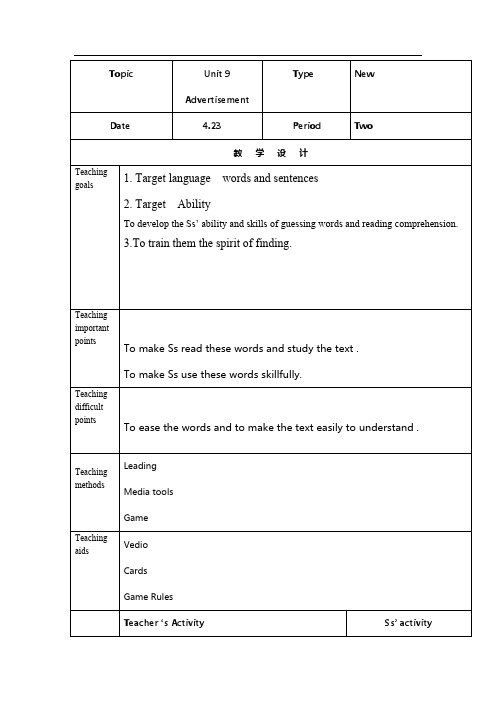
Topic Unit 9AdvertisementType NewDate 4.23Period Two教学设计Teachinggoals1. Target language words and sentences2. Target AbilityTo develop the Ss’ ability and skills of guessing words and reading comprehension.3.To train them the spirit of finding.TeachingimportantpointsTo make Ss read these words and study the text .To make Ss use these words skillfully.TeachingdifficultpointsTo ease the words and to make the text easily to understand .Teaching methods Leading Media tools GameTeachingaidsVedioCardsGame RulesTeacher ‘s Activity Ss’ activity3.T:We all know the information a bout theadvertisement by means of learning words “the firstsentence of the text “And then what is advertisement ?Let students to read the textand answer .And to find the key words of this pargragh.Thefollowing steps are similar to the first P4.SumText explanation/interpret 10marythekeywordsandGametimeTo announce them the rules of the game 5 (7’)Homew ork 1.wordsX 52.sentencesX5教学反思Positives : usede many kinds of tools to teach them ,and to shape a happy procedures ,And I so like the situation ,and everybody des,too. 5、关于坚持的名言,你既然期望辉煌伟大的一生,那么就应该从今天起,以毫不动摇的决心和坚定不移的信念,凭自己的智慧和毅力,去创造你和人类的快乐。
语文版中职英语(基础模块 下册)Unit 3《English Study》word教案
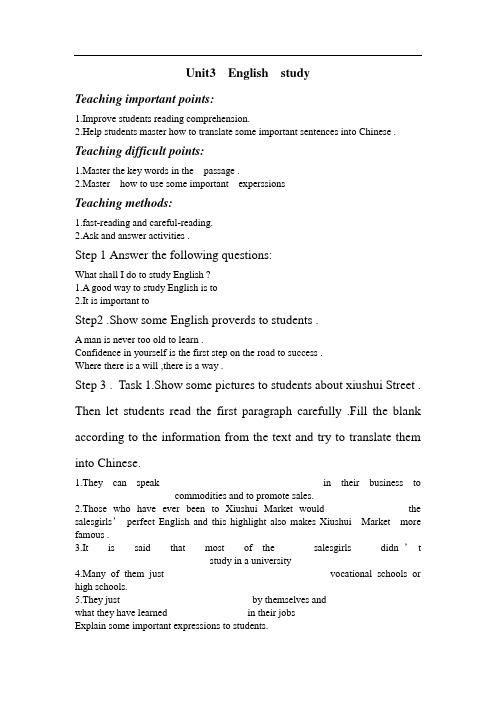
Unit3 English studyTeaching important points:1.Improve students reading comprehension.2.Help students master how to translate some important sentences into Chinese . Teaching difficult points:1.Master the key words in the passage .2.Master how to use some important experssionsTeaching methods:1.fast-reading and careful-reading.2.Ask and answer activities .Step 1 Answer the following questions:What shall I do to study English ?1.A good way to study English is to ____________2.It is important to __________________________Step2 .Show some English proverds to students .A man is never too old to learn .Confidence in yourself is the first step on the road to success .Where there is a will ,there is a way .Step 3 .Task 1.Show some pictures to students about xiushui Street . Then let students read the first paragraph carefully .Fill the blank according to the information from the text and try to translate them into Chinese.1.They can speak ___________ in their business to ______________ commodities and to promote sales.2.Those who have ever been to Xiushui Market would _________ the salesgirls’perfect English and this highlight also makes Xiushui Market more famous .3.It is said that most of the salesgirls didn’t ______________________ study in a university4.Many of them just _____________________ vocational schools or high schools.5.They just ________________________ by themselves and _______what they have learned __________ in their jobs________________Explain some important expressions to students.1.recommend sth. to sb. 把某物推荐给某人This book is very good, Tom recommended it to me.2.admire sb. for sth 因某事而钦佩某人I admire you for your honesty3.have a chance to do sth 有机会去做某事It‘s my honor to have this chance to attend the English Speech contest4.graduate from 毕业于About two years later, we will graduate from Kuancheng vocational school and go to the university.5.keep on doing sth 持续不断、坚持做某事He keep on doing homework for 2 hours.6.put……into practice 把……付诸实践We should put our ideas into practice.7.with confidence 充满信心We should face the life with confidence.Step4.Task 2.Read the second paragraph and fill in the blank .1.When we first start to study English, many of us thinkEnglish is _____________________ .2.so some of us ______________ or even give up.3.The salesgirls in Xiushui Market ____________us in learning English.Explain some important expressions to students.1.too......to ... 太.....而不能........The question is too difficult to answer.He is too young to join in the army.2. Lose confidence 失去信心She lose confidence in life .3. set a good example to 为......树立好榜样LeiFeng set a good example to us .Step5.Have a testComplete the follow sentences with the correct words in the box With confidence set a good example to too ...to.... graduate...from ..1.The child is _________ young _______ go to school .2.Our teacher has _________________ us in speaking English .3.You should answer these difficult questions ____________ .4.When did you _____________ Kuancheng vocational school ?Step 5 .Homework .1.Remember how to use the useful expressions .2.Reading the passage after class .因为我们就这么一辈子,几十年的光景,无法重来,开心也好,不开心也罢,怎么都是活着,那么何不让自己开开心心的过好每一天呢!生活虽辛苦,但我们一定要笑着过,以积极乐观的心态让日子过得有滋有味,这样才不白来人世走一遭,才会无怨无悔。
语文版中职英语(基础模块 下册)Unit 1《Travel》word教案
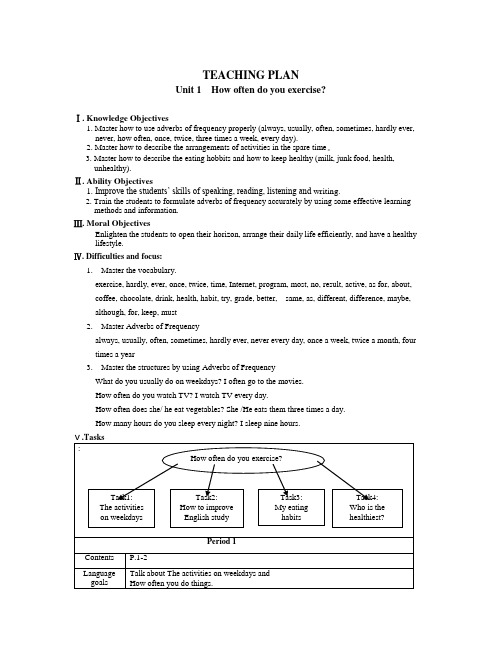
TEACHING PLANUnit 1 How often do you exercise?Ⅰ. Knowledge Objectives1. Master how to use adverbs of frequency properly (always, usually, often, sometimes, hardly ever,never, how often, once, twice, three times a week, every day).2. Master how to describe the arrangements of activities in the spare time。
3. Master how to describe the eating hobbits and how to keep healthy (milk, junk food, health,unhealthy).Ⅱ. Ability Objectives1. Improve the students’ skills of speaking, reading, listening and writing.2. Train the students to formulate adverbs of frequency accurately by using some effective learningmethods and information.Ⅲ. Moral ObjectivesEnlighten the students to open their horizon, arrange their daily life efficiently, and have a healthy lifestyle.Ⅳ. Difficulties and focus:1.Master the vocabulary.exercise, hardly, ever, once, twice, time, Internet, program, most, no, result, active, as for, about, coffee, chocolate, drink, health, habit, try, grade, better, same, as, different, difference, maybe, although, for, keep, must2.Master Adverbs of Frequencyalways, usually, often, sometimes, hardly ever, never every day, once a week, twice a month, four times a year3.Master the structures by using Adverbs of FrequencyWhat do you usually do on weekdays? I often go to the movies.How often do you watch TV? I watch TV every day.How often does she/ he eat vegetables? She /He eats them three times a day.How many hours do you sleep every night? I sleep nine hours.。
英语基础模块下册全册整套教案
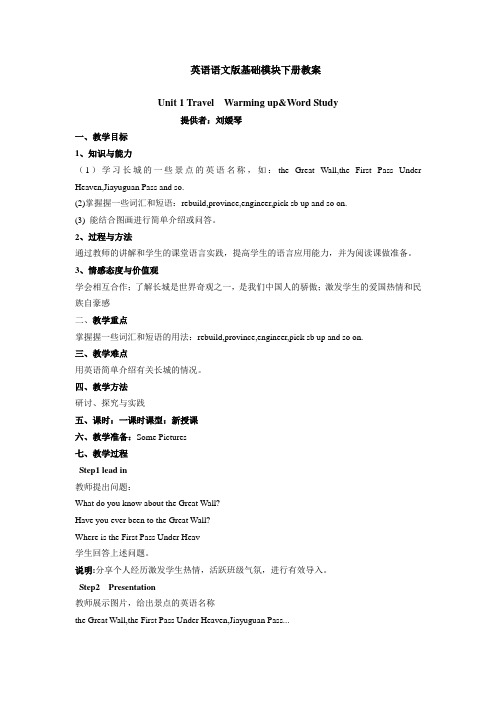
什么情况下要用被动语态呢?一般地说,有下面几种情况:
师生共同活动:
不知道谁是动作的执行者或没有必要。例如:
Paper is made from wood. (纸是由木材生产出来的。)
The house is quite old. It was built in 1950. (这座房子太旧了。它是1950年建成的。)
说明:学生精度课文,发现问题。培养学生合作学习、探究学习的良好习惯。
Step3 Explanation
教师解释课文中的一些长句,讲解课文中的下列语言点:
The teacher explains the following points:
问题一:The walls were built to protect states.修建城墙是为了保护他们的国家。句中的were built是过去时的被动语态结构。在句子的主动形式是:They built the walls t0 protect these states.
The classroom is cleaned by the students every day.
学生活动:Translate the sentences above.比较两个句子语气的侧重点。
说明:引出新课。
Step2 Explaining
教师活动:什么是被动语态?被动语态”的构成?
学生活动:be +过去分词+ (by+动作执行者)
Books and newspapers in the reading room mustnt be taken away. (阅览室的书籍和报纸不准带走。)
He was awarded first prize in that contest.
语文版中职英语(基础模块下册)Unit2《Shopping》word教案
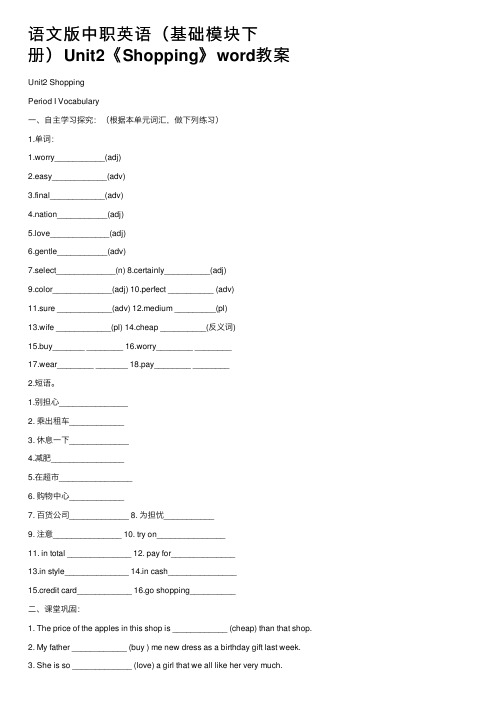
语⽂版中职英语(基础模块下册)Unit2《Shopping》word教案Unit2 ShoppingPeriod I Vocabulary⼀、⾃主学习探究:(根据本单元词汇,做下列练习)1.单词:1.worry___________(adj)2.easy____________(adv)3.final____________(adv)4.nation___________(adj)5.love_____________(adj)6.gentle___________(adv)7.select_____________(n) 8.certainly__________(adj)9.color_____________(adj) 10.perfect __________ (adv)11.sure ____________(adv) 12.medium _________(pl)13.wife ____________(pl) 14.cheap __________(反义词)15.buy_______ ________ 16.worry________ ________17.wear________ _______ 18.pay________ ________2.短语。
1.别担⼼_______________2. 乘出租车____________3. 休息⼀下_____________4.减肥________________5.在超市________________6. 购物中⼼____________7. 百货公司_____________ 8. 为担忧___________9. 注意_______________ 10. try on_______________11. in total ______________ 12. pay for______________13.in style______________ 14.in cash_______________15.credit card____________ 16.go shopping__________⼆、课堂巩固:1. The price of the apples in this shop is ____________ (cheap) than that shop.2. My father ____________ (buy ) me new dress as a birthday gift last week.3. She is so _____________ (love) a girl that we all like her very much.4. Would you mind me_____________ (smoke) in the room?5.Would you paid for it ___________(通过现⾦) or ___________(信⽤卡)?6.How much did you_____________ (pay) for your new car?7.They are_______________(清点,登记) all the goods in the store.8. There are several ___________ (type) of computers in this department.9.The coat is made______________(of/from) cotton.10._____________ (final),the police found the lost child.三、作业I.预习本单元阅读.II.完成以下练习.1、找出每组单词中拼写错误的⼀项肯定式:否定式:在句中可以作______________________________________等成分。
- 1、下载文档前请自行甄别文档内容的完整性,平台不提供额外的编辑、内容补充、找答案等附加服务。
- 2、"仅部分预览"的文档,不可在线预览部分如存在完整性等问题,可反馈申请退款(可完整预览的文档不适用该条件!)。
- 3、如文档侵犯您的权益,请联系客服反馈,我们会尽快为您处理(人工客服工作时间:9:00-18:30)。
英语语文版基础模块下册教案Unit 1 Travel Warming up &Word Study一、教学目标1、知识与能力(1)学习长城的一些景点的英语名称,如:the Great Wall, the First Pass Under Heaven, Jiayuguan Pass and so.(2)掌握握一些词汇和短语:rebuild, province, engineer, pick sb. up and so on.(3) 能结合图画进行简单介绍或问答。
2、过程与方法通过教师的讲解和学生的课堂语言实践,提高学生的语言应用能力,并为阅读课做准备。
3、情感态度与价值观学会相互合作;了解长城是世界奇观之一,是我们中国人的骄傲;激发学生的爱国热情和民族自豪感二、教学重点掌握握一些词汇和短语的用法:rebuild, province, engineer, pick sb. up and so on.三、教学难点用英语简单介绍有关长城的情况。
四、教学方法研讨、探究与实践五、课时:一课时课型:新授课六、教学准备:Some Pictures七、教学过程Step1 lead in教师提出问题:What do you know about the Great Wall?Have you ever been to the Great Wall?Where is the First Pass Under Heaven学生回答上述问题。
说明:分享个人经历激发学生热情,活跃班级气氛,进行有效导入。
Step2 Presentation教师展示图片,给出景点的英语名称the Great Wall, the First Pass Under Heaven, Jiayuguan Pass...说明: 学生熟悉英语景点名称,为后面的讨论做准备Step3 Practice in class1.教师讲解词汇和短语的用法:(1)The students read the words and phrases.(2) The students make the sentences with the words and phrases.2.教师布置讨论任务,给出例子:This is a beacon tower. It was used..3.学生分组,介绍长城的景点说明:锻炼学生合作运用英语力Step4 Students' Activity学生表演,,教师给予学生英语口语的帮助并鼓励他们开口说英语。
每组派代表作为导游介绍你长城景点说明: 锻炼学生英语口语能力Step5 Homework1.Practise introducing a place in English.2.Pre-view the text of reading.说明:为学习新课打基础,促进学生自主学习八、板书设计Warming up &Word StudyWords and phrasesrebuild重建province省engineer工程师For the first time 第一次Pick sb up开车接某人On business出差九、课后反思与建议The students are interested in this lesson, so they are lively in class, but they are not good at spoken English, they need improving it.Unit1 The Great Wall----reading一、教学目标1、知识与能力(1)掌握下列单词和短语的用法:be located in, have sth./sb. done; be forced to do sth,by hand, be famous for ..(2) 了解被动语态的用法。
(3)正确理解文章容,能准确回答课后的问题。
2、过程与方法通过读说练习达到教学目标。
3、情感态度与价值观理解长城是世界奇观之一,是我们中国人的骄傲;激发学生的爱国热情和民族自豪感。
二、教学重点1、掌握下列单词和短语的用法 2.Understand the text and answer the questions correctly .2、正确理解文章容,能准确回答课后的问题。
三、教学难点正确理解文章容,掌握阅读技巧。
四、教学方法任务型教学法;情景教学法五、课时、课型:一课时;新授课六、教学准备:多媒体,常规教具七、教学过程Step1 Lead in教师活动:播放关于长城的录像片,向学生简要介绍长城。
提出问题,导入课文教学:Do you know how the Great Wall was built and why it was built?学生活动:Answer the question.师生活动:Review the new words of the text.说明:激发学生进一步学习的热情。
Step2 Reading阅读环节一:教师布置任务,给出问题:Where is the Great Wall?When was the Great Wall first built?Who decided to have the walls linked and extended?When was the Great Wall rebuilt?学生活动:学生带着问题阅读。
说明:为后面的讨论做准备。
阅读环节二:精度课文,小组研讨。
学生活动:The students read the text carefully and find the long sentences and language points.教师布置学生仔细阅读课文,找出问题和课文中的语言点。
说明:学生精度课文,发现问题。
培养学生合作学习、探究学习的良好习惯。
Step3 Explanation教师解释课文中的一些长句,讲解课文中的下列语言点:The teacher explains the following points:问题一:The walls were built to protect states.修建城墙是为了保护他们的国家。
句中的were built 是过去时的被动语态结构。
在句子的主动形式是:They built the walls t0 protect these states.问题二:have the walls linked and extended 该结构中的have是使役动词,意思是:“使、让”,have sth./ sb.done意思是“使某物或某人被......(强调动作由别人来完成)”,其中的linked和extended是过去分词,表示被动。
问题三:在It took them more than ten years to build it under terribl conditions. 句子中it用作形式主语,真正的主语是不定式短语to build it under terrible conditions.这是一个很重要的句型,其结构是:It takes/took +sb. +some time+ to do sth. 意思是“做某事花费了某人多少时间”。
问题四:Look, on the top of the mountain is the Great Wall. 句中的on the top of the mountain不是句子的主语,本句是倒装句结构,它的正常语序应是:The Great Wall is on the top of the mountain在英语中,有时为了“强调句子中的状语、表语等”而使用倒装结构。
Learn the following language points:protect...from/againsthave sth/sb doneLead tothousands ofIt is said that...It takes/took sb. .some time to do somethingStep4 PracticeThe students complete the sentences with some useful expressions(PPT) 说明:学生完成一些练习,巩固知识点。
Step5Extensive Reading 教师播放长城风景片学生活动:The students read the text again and try to retell the text说明:学生阅读课文,鼓励学生复述,锻炼学生口语表达能力。
Step61.Read the text.plete the exercise of the language Study.说明:巩固知识点八、板书设计Unit1 The Great Wall ----Reading1. Skimming Answer the questions2. Carefully ReadingThe Language Pointsprotect...from/againsthave sth/sb doneLead tothousands ofIt is said that...It takes/took sb .some time to do sth课后反思与建议Most of the students can understand the text well, but they are not good at express by themselves in English. It is helpful for them to read the text after class.Unit1 Grammar Passive Voic e一、教学目标:1、知识与能力(1)掌握被动语态的结构和用法。
..(2)在练习中正确运用被动语态。
2、过程与方法通过不同的练习途径使学习掌握被动态的用法。
3.、情感态度与价值观消除学习的心理障碍,增强二、教学重点(1)掌握不同时态的被动语态结构。
(2)如何把主动与台转化为被动语态。
三、教学难点能够正确地王城语法练习。
四、教学方法:讲解与练习相结合五、课时、课型:一课时、新授课、六、教学准备:多媒体、常规教具七、教学过程Step1 Presentation教师活动:Show the sentences:The students clean the classroom every day.The classroom is cleaned by the students every day.学生活动:Translate the sentences above.比较两个句子语气的侧重点。
